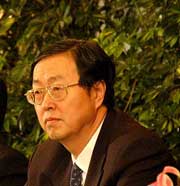|
 |
| Chinese central bank governor Zhou Xiaochuan
(file photo) | China's central bank pledged Monday to keep the newly unshackled yuan basically stable but urged
fresh efforts to wean the
economy off export-driven
growth.
In a statement posted on its website after the 3rd-quarter meeting of
the Monetary Policy Committee, the People's Bank of China (PBOC) said
China's fast-growing trade
surplus was a problem for the overall economy.
"There should be concerted macro-policies to actively expand (domestic)
consumer demand and speed up restructuring the economy and foreign trade
to improve economic efficiency and achieve a sustainable economic growth
and stable prices," the statement said.
The language reflects a hardening conviction in Beijing that China's
growth model, powered by investment geared towards exports, leaves it
vulnerable to a proliferation of trade barriers. The United States has
imposed quotas on a range of Chinese textile exports, and Beijing has
lately agreed to curbs on textile sales to the European Union following
difficult negotiations.
China saw a trade surplus of US$60.2 billion in the first eight months
this year, and economists expect the figure for the whole year to amount
to $80 billion or even higher.
Foreign governments, the U.S. Congress especially, have said the yuan
remains cheap despite a landmark 2.1 percent hike against the U.S. dollar
on July 21, when the bank scrapped a 11-year-old dollar peg and adopted a managed float system.
The authorities have since allowed the yuan, also known as the
renminbi, to rise on its foreign exchanges market. The yuan closed at 8.09
per dollar on Monday.
"We should continue perfecting the managed float exchange rate regime
and keep the renminbi exchange rate basically stable at a reasonable and
balanced level," the bank said. It said it would seek to maintain monetary
policy "continuity and stability".
The statement said China's overall economic growth rate, which has been
9 percent or more in the past eight quarters, was easing a little but that
fixed-asset investment in some sectors was still too strong.
The government has been using lending curbs and administrative orders
for the past two years to rein in excessive investment in sectors such as
autos, steel, cement and real estate.
At the same time it has been spending freely to overcome bottlenecks in
the economy. Even so, the central bank said supplies of coal, oil and
power were still quite tight.
(China Daily) | 